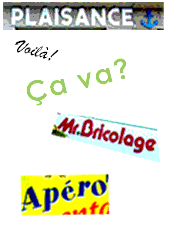
  |
 Tips
and Notes > "Very" French Tips
and Notes > "Very" French |
|
| 10 "very" French Words
found in FRENCH FOR CRUISERS |

|

|
Some words like Ça
va and Voilà will
quickly become part of your vocabulary.
Other words like La
plaisance and Le mouillage pertain
to boating and will answer some of your questions about the signs
you see in harbor.
Scroll down or click on any word
below ...
|

|

